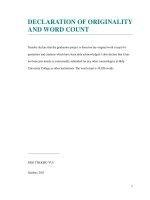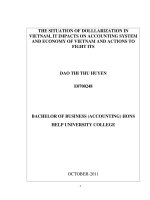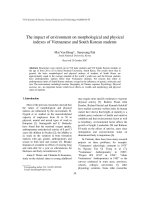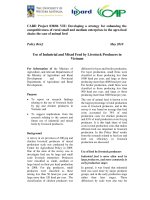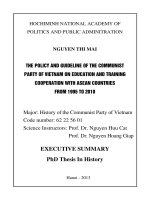Comments by the secretariat of UNCITRAL on the draft decree on commercial mediation proposed by the government of vietnam
Bạn đang xem bản rút gọn của tài liệu. Xem và tải ngay bản đầy đủ của tài liệu tại đây (67.45 KB, 5 trang )
25 June 2015
Comments by the Secretariat of UNCITRAL on the draft Decree on Commercial
Mediation proposed by the Government of Vietnam
1.
We are grateful for the opportunity to provide comments on the draft Decree on
Commercial Mediation (“draft Decree”). Indeed, UNCITRAL has adopted in 2002 a Model Law
on International Commercial Conciliation (“Model Law”) and the scope of the two texts is
similar. The initiative of preparing the draft Decree is welcome, as mediation is being
increasingly used in dispute settlement practice in various parts of the world. Legislation on
mediation is useful to encourage the development of mediation and ensure that it becomes a
dispute resolution option preferred and promoted by government agencies, as well as in
community and commercial spheres.
2.
The Model Law was conceived as an effective tool for States to modernize their
legislation. It is a short text, which provides for default rules on the mediation procedure. It
does not address questions of accreditation of mediators, or mediation service providers,
which are matters better organized at the level of the States. Therefore, the comments of the
UNCITRAL Secretariat will be limited to the sections of the draft Decree addressing the
mediation procedure.
3.
The draft Decree reflects the important principle that mediation is a fully consensual
process, and that the parties are free to determine the most appropriate procedure. It could
provide a good basis for development of mediation in Vietnam. There are, however, a few
matter highlighted below that would require careful consideration. The UNCITRAL Secretariat
stands ready to provide further clarification as may be required.
Structure of the draft Decree
4.
Regarding the structure of the draft Decree, it may be advisable to place chapter IV
after chapter II, so that (1) the main principles on mediation (chapter I), commercial mediators
(chapter II) and the mediation procedure (chapter IV) could form a first part of the Decree
addressing the mediation procedure, and (2) service providers (chapter III), foreign
organizations (chapter IV) and State management (Chapter V) could form a second part of the
Decree addressing the institutional framework for mediation.
5.
In terms of substance, there are important provisions that are missing in the draft
Decree. Those provisions are the following.
Missing provisions:
6.
Article 1(3) of the Model Law on definitions could be included under chapter I of the
draft Decree, as follows: “‘Mediation’ means a process whereby parties request a commercial
mediator to assist them in their attempt to reach an amicable settlement of their dispute
arising out of or relating to a contractual or other legal relationship. The commercial mediator
does not have the authority to impose upon the parties a solution to the dispute.”
7.
Such a provision would clarify the scope of the draft Decree. The provision that the
commercial mediator does not have the authority to impose upon the parties a solution to the
dispute is a key feature of mediation. That provision would be a useful addition that would
permit to differentiate arbitration from mediation.
8.
Article 4 of the Model Law on the commencement of conciliation proceedings provides
that :
“ 1. Conciliation proceedings in respect of a dispute that has arisen commence on the day on
which the parties to that dispute agree to engage in conciliation proceedings.
2. If a party that invited another party to conciliate does not receive an acceptance of the
invitation within thirty days from the day on which the invitation was sent, or within such other
period of time as specified in the invitation, the party may elect to treat this as a rejection of
the invitation to conciliate.”
9.
It is recommended to add a provision on the date of commencement of the mediation
proceedings because deadlines may start running from that date. That provision would be
used in the event the parties did not agree on the matter. It could be added in chapter IV of
the draft Decree.
10.
Article 10 of the Model Law on admissibility of evidence in other proceedings reads as
follows:
“1. A party to the conciliation proceedings, the conciliator and any third person, including
those involved in the administration of the conciliation proceedings, shall not in arbitral, judicial
or similar proceedings rely on, introduce as evidence or give testimony or evidence regarding
any of the following:
(a)
An invitation by a party to engage in conciliation proceedings or the fact that a
party was willing to participate in conciliation proceedings;
(b)
Views expressed or suggestions made by a party in the conciliation in respect
of a possible settlement of the dispute;
(c)
Statements or admissions made by a party in the course of the conciliation
proceedings;
(d)
Proposals made by the conciliator;
(e)
The fact that a party had indicated its willingness to accept a proposal for
settlement made by the conciliator;
(f)
A document prepared solely for purposes of the conciliation proceedings.
2. Paragraph 1 of this article applies irrespective of the form of the information or evidence
referred to therein.
3. The disclosure of the information referred to in paragraph 1 of this article shall not be
ordered by an arbitral tribunal, court or other competent governmental authority and, if such
information is offered as evidence in contravention of paragraph 1 of this article, that evidence
shall be treated as inadmissible. Nevertheless, such information may be disclosed or admitted
in evidence to the extent required under the law or for the purposes of implementation or
enforcement of a settlement agreement.
4. The provisions of paragraphs 1, 2 and 3 of this article apply whether or not the arbitral,
judicial or similar proceedings relate to the dispute that is or was the subject matter of the
conciliation proceedings.
5. Subject to the limitations of paragraph 1 of this article, evidence that is otherwise
admissible in arbitral or judicial or similar proceedings does not become inadmissible as a
consequence of having been used in a conciliation.”
11.
Article 10 aims at preventing the use of certain information in subsequent judicial or
arbitral proceedings. It provides for two results with respect to the admissibility of evidence in
other proceedings: an obligation on the parties not to rely on the types of evidence specified in
article 10 and an obligation of courts to treat such evidence as inadmissible.
12.
It is crucial to include in a legislative text on mediation provisions modelled on article
10 for the following reasons. In mediation proceedings, the parties may typically express
suggestions and views regarding proposals for a possible settlement, make admissions or
indicate their willingness to settle. If, despite such efforts, the mediation does not result in a
settlement and a party initiates judicial or arbitral proceedings, those views, suggestions,
admissions or indications of willingness to settle might be used to the detriment of the party
who made them. That risk may discourage parties from actively trying to reach a settlement
during mediation proceedings. Thus, article 10 is designed to encourage frank and candid
discussions in mediation by prohibiting the use of information listed in paragraph 1 in any later
proceedings.
Article-by-article comments:
Chapter 1 - General provisions
Article 4 - Principles of dispute settlement by commercial mediation
13.
Paragraph 1 of article 4 could more clearly provide for the freedom of parties to agree
on the mediation procedure, and a first sentence, modelled on article 6(1) of the Model Law
could be added as follows: “The parties are free to agree, by reference to a set of rules or
otherwise, on the manner in which the conciliation is to be conducted. Commercial mediators
shall respect (...) social ethics.”
14.
It could be complemented by a provision on the manner in which mediation would be
conducted if there is no agreement between the parties. For instance, article 4(1) could be
complemented by the following provision: “Failing agreement on the manner in which the
mediation is to be conducted, the commercial mediators may conduct the mediation
proceedings in such a manner as they considers appropriate, taking into account the
circumstances of the case, any wishes that the parties may express and the need for a
speedy settlement of the dispute.” That matter is addressed in article 20(1) of the draft
Decree, but may deserve a clarification under article 4.
Missing principle in article 4:
15.
It could be added in article 4 that “the commercial mediator may, at any stage of the
conciliation proceedings, make proposals for a settlement of the dispute.” This is an
important clarification, and a feature that distinguishes arbitration from mediation. This would
complement the principle contained in article 6 that the parties may settle the dispute at any
time.
Chapter II - Commercial mediators
Article 9 - Making a list of commercial mediators, registration for conducting ad hoc
commercial mediation
16.
The provisions of article 9.2 are problematic for international commercial mediation, as
they would prevent a party to choose a foreign commercial mediator. We would like to suggest
that specific provisions be added to address that situation.
Article 10 - Rights and obligations of commercial mediators.
17.
Article 10 addresses important aspects of the mediation procedure, including
confidentiality. It is advisable to complement the provision on confidentiality by a provision on
non-disclosure of information, as follows: “When the commercial mediator receives
information concerning the dispute from a party, he or she may disclose the substance of that
information to any other party to the mediation. However, when a party gives any information
to the commercial mediator, subject to a specific condition that it be kept confidential, that
information shall not be disclosed to any other party to the mediation.”
Chapter IV - Sequences and procedures for commercial mediation
Article 23 - Choosing of commercial mediators
18. It would be useful to clarify that “There shall be one commercial mediator, unless the
parties agree that there shall be two or more commercial mediator. The parties shall
endeavour to reach agreement on a commercial mediator or commercial mediators, unless a
different procedure for their appointment has been agreed upon.”.
Article 28 - Unsuccessful mediation
19. The provision that “the parties shall be entitled to request the continuation of
mediation”, should be clarified. It is uncertain under that provision who decides. As it is
important that mediation remains a consensual process, it would be preferable to provide that
“all the parties shall agree to continue the mediation”.



